
Best hybrid SUVs
Last updated December 21, 2021
Combining a low-emissions electrified powertrain with crowd-pleasing looks, hybrid SUVs are fast becoming go-to cars for families and company car drivers alike, with sales climbing annually since their 2012 release.
These versatile motors feature a hybrid powertrain, fusing the silent emission-free driving of an EV with a traditional fuel tank that eliminates range anxiety. Plus, they’re an ideal compromise if you’re not quite ready to make the switch to an all-electric car.
Hybrid SUVs often make sound financial sense, as their equivalent diesel or petrol model can cost significantly more as a company car – but more on this later. Moreover, larger hybrid SUVs offer more room than hatchbacks, easing concerns about the hybrid system eating into the cabin or boot space.
With these benefits in mind – and there are plenty more – we’ve collated eight of the best hybrid SUVs on the market.
Value your car in under 30 seconds
What is a hybrid SUV?
A hybrid SUV is a car powered by an internal combustion engine that works in tandem with an electric motor.
The electric motor augments the engine and sometimes replaces it for limited periods, permitting it to run in an all-electric or EV mode for short distances.
Aside from tax benefits and incentives, hybrid SUVs also benefit from ample passenger space due to the hybrid system’s location under the boot floor, making them ideal for families or company car drivers.
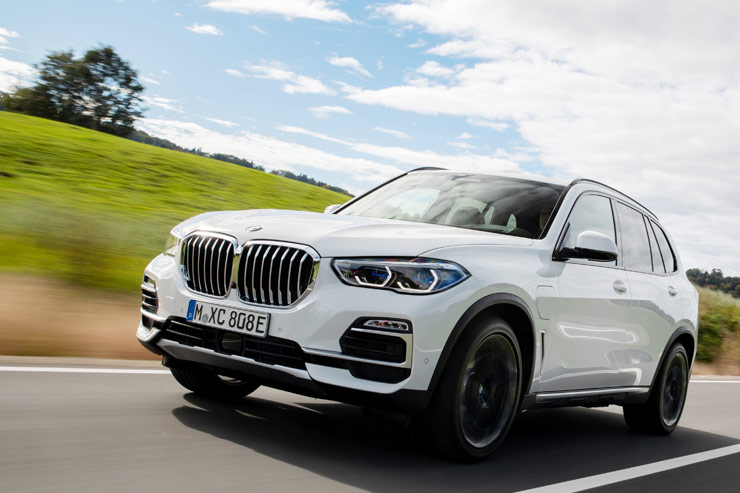
BMW X5 xDrive45e
Pairing a powerful 3.0-litre six-cylinder petrol engine with a 24kWh battery, the X5 xDrive45e covers up to 54 miles solely on electric power – a benchmark for all plug-in models.
The X5’s large battery means some buyers will barely ever use the engine, but the well-integrated dual power sources add to the X5’s air of luxury.
The six-cylinder engine is refined and quiet at speed, delivering strong performance in tandem with the electric motor – the car can reach 0-62mph in just 5.6 seconds, according to BMW.
Despite the extra cylinders, the X5 is more economical than its predecessor according to the WLTP economy scale (31-27 g/km CO2 emissions), plus it’s more benefit-in-kind (BIK) tax-efficient at 7%.
A full charge takes seven hours with a standard BMW charging cable. Upgrade to a fast AC charging cable (type 2 and you will significantly reduce the charging time. The only real downside is that the X5 doesn’t offer a seven-seat option.
Starting at £68,245, you can find out more about the X5 xDrive45e here.
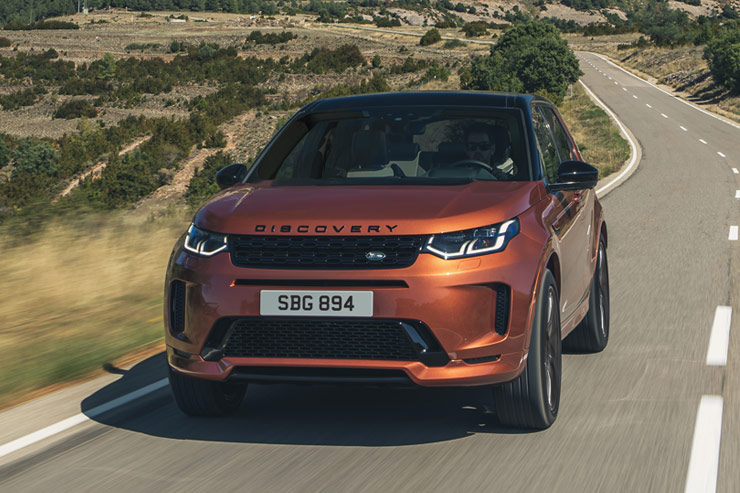
Land Rover Discovery Sport P300e
Despite being late to the plug-in SUV market, Land Rover recently launched two compact SUV PHEVs: the Discovery Sport P300e and the Evoque PHEV.
Whilst the Discovery Sport may be deemed less aesthetically pleasing than the Evoque or Velar with their curved edges and sharp details, it more than compensates with a more spacious interior, larger boot capacity and 4x4 capability.
Although the P300e doesn’t have seven seats like previous versions, it retains its sliding second row. Pop the bonnet and you’ll find an all-new three-cylinder Ingenium petrol engine, plus a smooth-shifting eight-speed automatic gearbox in the cabin with a powerful electric motor on the rear axle.
Unlike many PHEVs, there’s a rapid charging option up to 32kW, which should come in handy when you’re out and about. However, its appeal may be blunted by its range-extended fuel economy (33mg).
The P300e starts at £31,920 and you can find more information about its specifications here.
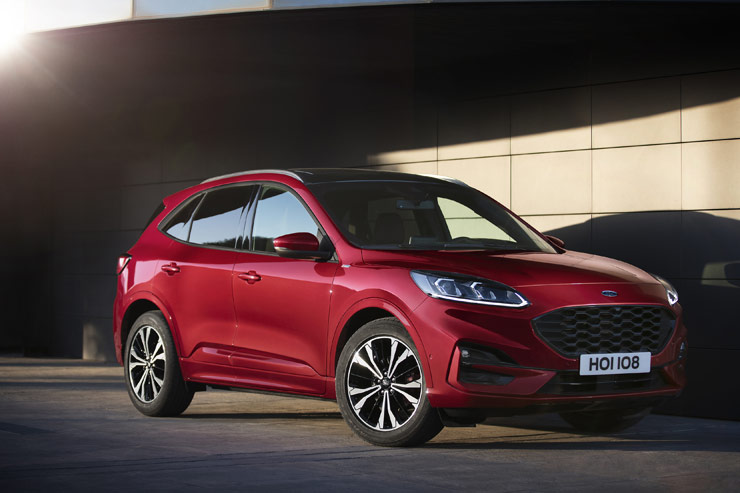
Ford Kuga 2.5 PHEV
Now in its third generation, the Ford Kuga covers all bases by including hybrid and plug-in hybrid power choices in its impressive SUV line-up.
The PHEV version provides an electric-only range between charging, underscoring Ford's commitment to zero-emissions motoring. What's more, company car drivers will enjoy the financial benefits of low CO2 emissions when it comes to paying their BIK tax bills.
The Kuga PHEV offers a smooth ride and handling along with tight corner control without sacrificing comfort. Under the bonnet, you'll find a 2.5-litre Atkinson-cycle petrol engine combined with an electric motor that enables the car to hit 62mph in under ten seconds.
Ford offers several customisation options, allowing you to strike the right balance between looks, economy, and onboard tech.
Starting at £26,985, you can find out more information about the Ford Kuga PHEV here.
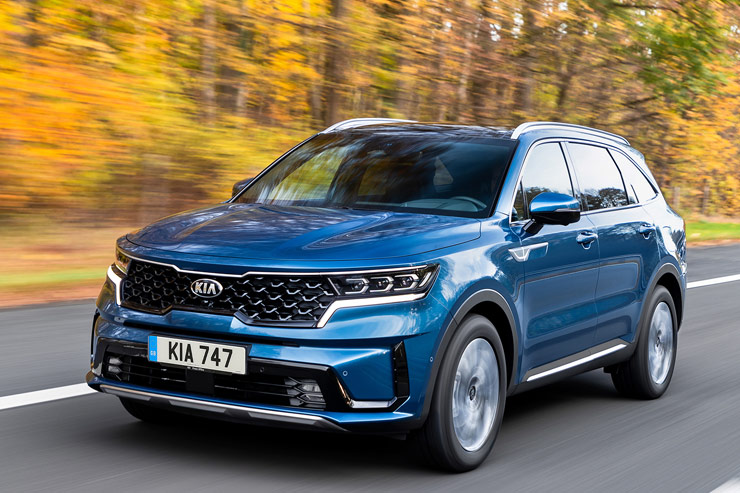
Kia Sorento 1.6 T-GDi PHEV
The fourth-generation Kia Sorento PHEV combines good real-world fuel economy with comparatively low CO2 emissions.
The plug-in version combines a 3.8kWh battery with a 1.6-litre turbo petrol engine, while the total power stands at 261bhp.
Kia states the Sorento PHEV can drive up to 35 miles solely on electric power, resulting in a fleet-pleasing 38g/km of CO2 emissions and an 11% BIK tax rating, matching the Ford Kuga PHEV and outstripping the impressive Volvo XC90 Recharge T8.
Throw in Kia’s unmatched seven-year warranty, and you’ve got an impressive large hybrid SUV on your hands.
Discover the Kia Sorento PHEV, starting at £44,995, here.
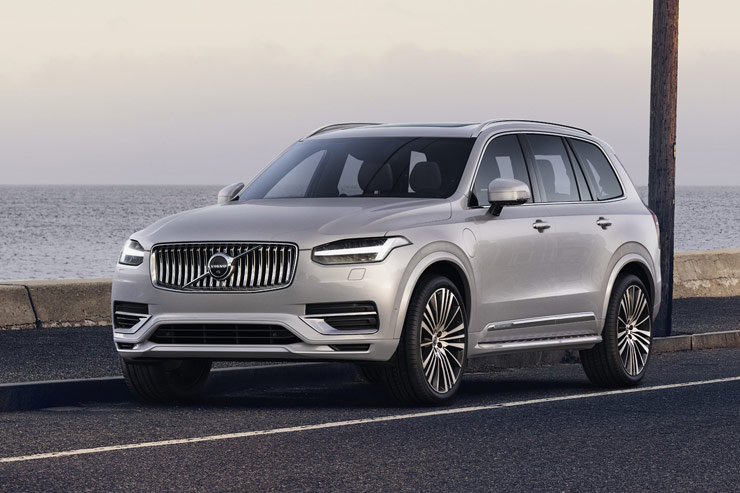
Volvo XC90 Recharge T8
The XC90 Recharge T8 is Volvo’s largest SUV and expertly blends style, spaciousness, cabin ambience and engine efficiency, far surpassing expectations for a car this size.
It can travel just over 30 miles on electric power alone, putting it into the 11% BIK bracket, so it’s not quite as tax efficient as the table-topping BMW X5 xDrive45e. With that being said, it’s the quickest XC90 by some distance, racing from 0-62mph in just 5.8 seconds.
In short, the T8 offers a smooth ride, versatile interior, top-notch safety credentials, and plenty of kit, making it a fine hybrid SUV choice.
Starting at £67,125, discover the Volvo XC90 Recharge T8 here.
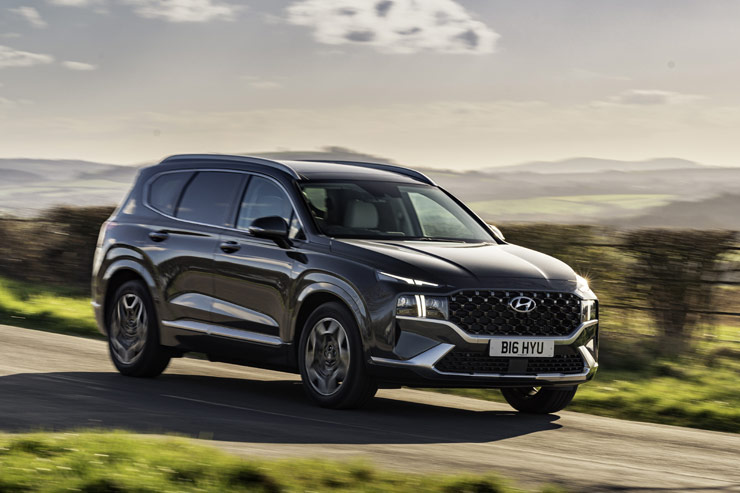
Hyundai Santa Fe
The Hyundai Santa Fe is a family all-rounder that combines space, comfort, plenty of tech as standard and a decent drive from its new hybrid and plug-in hybrid (PHEV) powertrains. Hyundai provides seven seats as standard whether you opt for the regular hybrid or plug-in version.
Pick the Santa Fe in its 227bhp mild-hybrid guise and you can choose from two- or four-wheel drive, but the 261bhp PHEV is four-wheel drive only. All versions come with a six-speed automatic transmission as standard.
The Santa Fe’s 2021 update includes a refined front end and revisions to the centre console and infotainment system, while Hyundai's best-in-class five-year mileage warranty provides extra peace of mind.
Starting at £45,660 with a BIK from 10%, you can find more information on the Hyundai Santa Fe here.
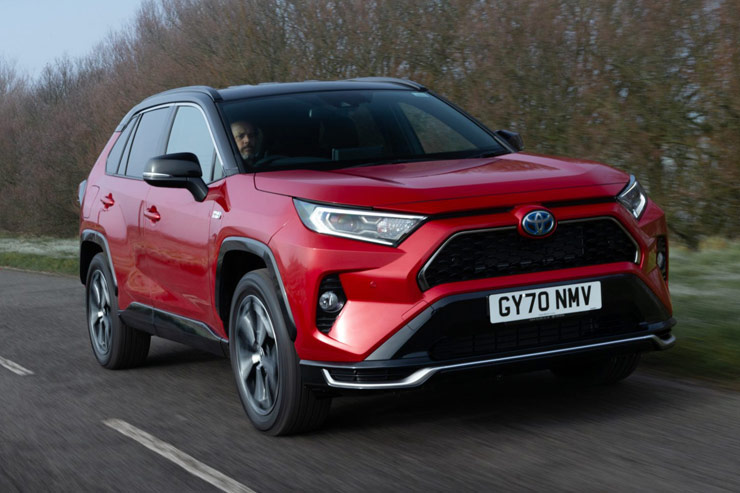
Toyota RAV4 PHEV
A Toyota staple for a quarter of a century, the RAV4’s latest iteration reinvents its aesthetic while producing just shy of 220bph courtesy of a new 2.5 petrol engine-electric motor combo.
The Toyota RAV4 PHEV’s low CO2 emissions (22 g/km) and excellent economy (282.4 mpg) make it an ideal hybrid for families and company car drivers alike. Moreover, it’s spacious, practical, and packed with onboard tech including Toyota Touch 2 with Go Navigation, Apple CarPlay, Android Auto, and much more.
Starting at £42,960, it’s not the cheapest hybrid SUV on our list, but its credentials, backed by Toyota’s stellar reliability record, make it a hybrid SUV worth considering.
You can find out more about the Toyota RAV4 PHEV here.
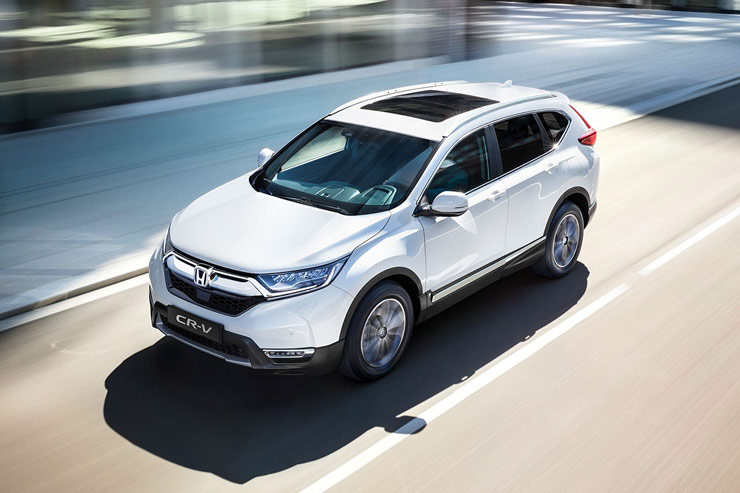
Honda CR-V Hybrid
The first Honda hybrid to have all-wheel-drive, the CR-V Hybrid features a tweaked two-motor hybrid system first found in the Accord, which has improved the efficiency of the vehicle and smoothed the ride.
The CR-V is silent at low speeds when running on electricity, but you’ll need the 2-litre engine to maximise its 184bhp for overtaking. It comes with a choice of front- or all-wheel drive but it’s worth noting that efficiency drops to 39.2-39.8mpg and 161-163g/km of CO2 for the latter.
Honda’s hybrid technology includes a self-charging mechanism that generates power as you drive, so there’s no need to plug in or plan your journey around charging stations. In addition, its seamless driving modes shift automatically as you drive – maximising performance in any environment.
The Honda CR-V Hybrid starts at £31,470 and you can find out further technical details and specifications here.
Are hybrids cheaper to run than petrol and diesel cars?
One of the main benefits of a hybrid car is the greater fuel economy, with hybrids using up to 30% less fuel per mile than conventional fuel-powered vehicles, so you'll be able to save on your fuel costs.
If you live in a city, have access to charging facilities, and most of your journeys are less than 30 miles, a plug-in hybrid could further reduce your fuel costs as much of your driving will rely solely on electricity.
However, note that when a hybrid car's battery runs out of electricity, it'll revert to its petrol engine and return relatively poor fuel efficiency. Therefore, if you spend a lot of time on the road, particularly driving at high speeds, a petrol or clean diesel engine may work out cheaper in the long run.
Do I pay less tax if I buy a hybrid?
Previously, several tax advantages were available to those buying hybrid and plug-in hybrid vehicles, but many have been scaled back or scrapped in recent years.
Before introducing new car tax rules in April 2017, new hybrids and PHEVs were eligible for free road tax if they emitted less than 100g/km CO2. This exemption now applies to new zero-emission, pure electric cars only.
However, used hybrids and PHEVs registered before 2017 are still subject to the old car tax system, so they're still eligible for free road tax, providing they emit less than 100g/km CO2.
New hybrids and PHEVs with a sub-£40,000 list price cost a flat £135 to tax after the first year - £10 less than their petrol or diesel equivalent. For cars costing over £40,000, the premium tax levied from years two to six is now £320 a year.

